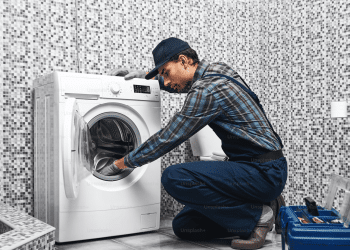Table of Contents

It’s a good idea to take stock of how fireproof your home is from time to time, especially if you live in a region where wildfires are common. Do you have the right solutions put in place to prevent, detect, and remediate fires? If you think there’s still room for improving how fireproof your home is, here are some tips that will help you get started.
1 – Get fire extinguishers
You may not be required by your local laws to have a fire extinguisher at home, but it’s still a good idea to have one or more. Get a few compact residential extinguishers, train on how to use them, and make sure to get them inspected periodically to make sure they are in working order.
The extinguisher’s manual will tell you how often inspection and maintenance need to be performed by a professional qualified to provide this type of fire extinguisher service.
2 – Clear the danger zones
Two of the most common causes of residential fires are kitchen accidents and electrical faults. And you can help prevent both by keeping the areas more likely to be affected clear of flammable materials.
This means there should be no curtains, soft fabrics, or flammable liquids stored around the stove or the oven. Nor should anything flammable be kept around exposed power outlets. Electrical faults can cause sparks to jump out of open power outlets, either on their own or when you plug something into them, which can start a fire If all the stars align.
3 – Smoke detectors
Catching a fire early can be the difference between a minor accident and a total catastrophe, so it’s a good idea to have a few smoke detectors around the house.
4 – Get rid of old leaves
Leaves and other types of dry debris left around your property can all become fuel for a potential wildfire, so it’s best to get rid of those hazards periodically. Make sure you clean not only your front and back yard but also your rooftop and your gutters.
5 – Fire resistant furniture
Switching to fire-retardant furniture and bed sheeting can also go a long way towards protecting your home from fires. That’s because the less fuel a fire is able to find when it gets in your home, the less damage it’ll be able to cause. So making sure your furniture is all fire-resistant can make the difference between a fire that ruins one room and fire that damages the entire house.
The same goes for bedsheets, carpets, curtains, and anything else that could provide easy fuel for a potential fire. Investing in fire-resistant materials may cost more upfront, but it can have great benefits in the long run.
Another alternative is to simply coat your furniture and other potential sources of fuel in fire retardant chemicals. There are environmentally-friendly products out there that allow you to coat fabrics with a fire retardant chemical layer. This will provide added protection without posing a health hazard to the people getting in contact with those soft furnishings.
The only downside is that said chemical treatments don’t last forever. You’ll have to apply the treatment again once every six months or once a year, depending on the product you choose.







